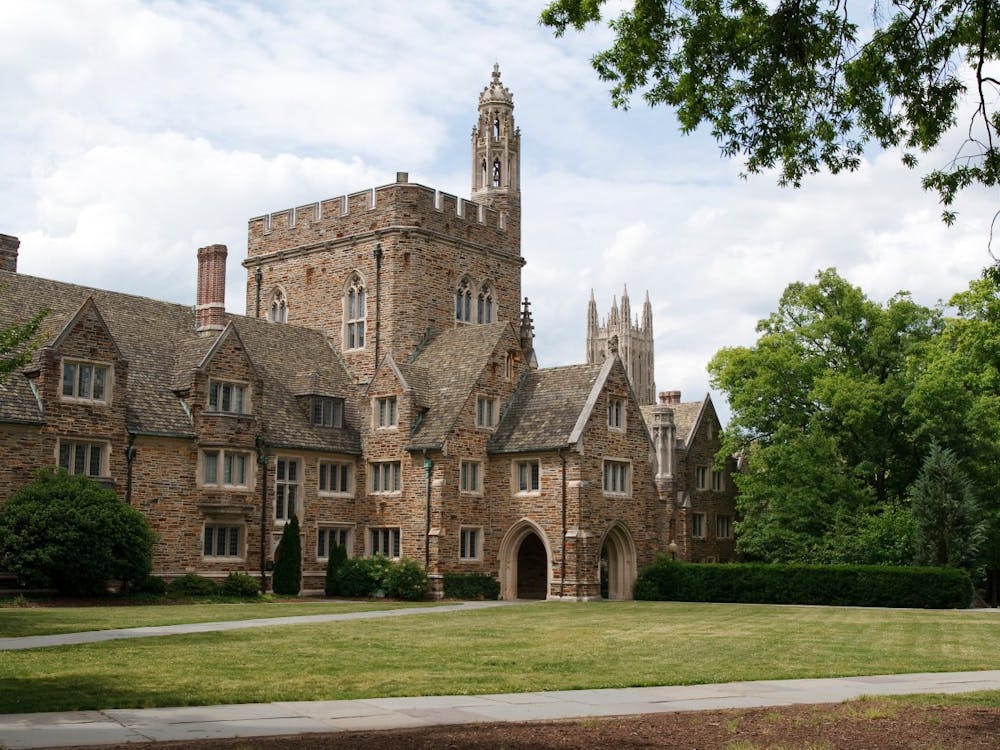Only four fraternities remain in the Duke Interfraternity Council, after nine chapters chose to disaffiliate from Duke in favor of membership in the Durham IFC.
Those who disaffiliated generally cited two primary grievances: new rules regarding recruitment and housing, as well as a general concern about Duke administrators’ visions for the future of Duke Greek life misaligning with the members’ visions. The leaders of the four fraternities that remain affiliated, however, say that they’re looking forward to a bright future for their organizations.
The four remaining members of Duke IFC are Chi Psi, Delta Kappa Epsilon, Psi Upsilon and Sigma Phi Epsilon. While each chapter president named a unique set of reasons for their fraternity’s decision to remain affiliated with Duke, common ideas included remaining connected to Duke-provided resources, maintaining access to an on-campus housing section and working toward positive reforms within the Duke IFC.
Junior Daniel DeVault, president of Duke’s chapter of DKE, said that the decision to remain affiliated was a relatively easy one for his chapter and ultimately had a lot to do with the desire to retain an on-campus housing section. DeVault noted that his fraternity currently has ten active members, so it would be difficult to fill a house off campus.
“Because we’re a smaller fraternity, we were worried about how we could continue to exist off-campus. We’re happy that we have a place in Edens next year. We think that will be really helpful for us. That’s a lot easier to maintain than an off-campus living space,” said DeVault.
DeVault added that a significant fraction of DKE members—“about a quarter to a third, in recent memory”—rushed as sophomores, so the fraternity is used to facilitating a recruitment process for older students. He also reflected that Duke IFC recruitment will only end up taking place one semester later than it has in past years, taking place in sophomore fall instead of spring of students’ first year, so he doesn’t think it will be too big of a problem.
“The biggest argument boiled down to, are we confident that we can recruit sophomores going forward? And finally we decided that, yes, we were confident we could abide by Duke’s rules going forward, especially once COVID is over,” said DeVault. “We think that when things return to normal, our traditional recruitment strategies will work again.”
DeVault said the DKE executive board voted unanimously not to disaffiliate several months before the official Duke IFC disaffiliation vote.
Senior Sarah Teixeira, the president of Duke’s Psi Upsilon chapter, said that the members of the fraternity feel optimistic about having a more powerful voice in the Duke IFC now that the majority of its members have disaffiliated. Psi Upsilon is the only co-ed fraternity in the Duke or Durham IFC and currently has 16 active members.
Teixeira said that Psi Upsilon members were generally in agreement that they didn’t want to disaffiliate from Duke, with a major reason being their desire to keep a housing section on-campus.
“We never really considered disaffiliating because we feel like a space like ours needs to be integrated with the Duke community to succeed. One of the huge aspects that we appreciate about being affiliated with Duke is the housing that we get,” Teixeira said.
Teixeira added that without an on-campus space, she isn’t confident that the fraternity would be able to survive.
While Psi Upsilon members appreciate having access to Duke-provided housing, Teixeira said that Duke’s decision to defer recruitment to sophomore year is “really terrible, at least for us.” The fraternity was not able to pledge any new members during this year’s sophomore-only recruitment process.
Historically, Teixeira said, Psi Upsilon has not had much of a voice in the IFC, largely because of the large number of fraternities in the organization. However, the new IFC executive board is composed of three people, two of whom are women of color who are members of Psi Upsilon.
“That’s a radical shift from the past IFC shift, which was entirely men,” she said.
One initiative Psi Upsilon plans to use its newfound power to promote is making the language used in the IFC constitution and in IFC communications more inclusive.
“I think changing the language will change the culture, in a way, because more women and non-binary voices will be present in these conversations,” Teixeiera said.
Similarly, Brandon Weiss, a sophomore and president of Duke’s chapter of Chi Psi, wrote in an email that his fraternity’s decision not to disaffiliate also had a lot to do with wanting to create positive change within the IFC.
“We want our feedback at Chi Psi to be valued, and this felt like the most reasonable solution for being able to work with Duke to create positive change and benefit the school’s Greek life overall,” Weiss wrote.
Some of the issues Chi Psi hopes to address within the IFC are sexual harassment, hazing, alcohol misuse and discrimination, according to Weiss.
While sophomore recruitment may pose a challenge for Chi Psi going forward, Weiss wrote that one of Chi Psi’s biggest reasons for remaining affiliated was keeping access to resources provided by Duke. He ultimately feels optimistic about Chi Psi’s future at Duke.
“We have awesome support from alumni and our Central Office. We have staff and faculty and the Duke IFC behind us, and that makes it hard to be anything but optimistic. With this support system, we expect good things to continue happening for Chi Psi,” Weiss wrote.
Duke’s SigEp chapter president Robert Baldoni Jr., a senior, wrote in an email that while his fraternity disagreed strongly with Duke’s new housing policies, which include deferring recruitment to sophomore year and limiting on-campus housing sections to juniors and seniors, members ultimately believed that they needed to remain affiliated with Duke in order to “achieve [their] goals and grow as an organization.”
Baldoni Jr. listed three major reasons for the fraternity’s decision to remain affiliated: They want brothers to have a rewarding and safe fraternity experience, they believe that remaining affiliating will best preserve their opportunity to give back to the Duke community, and the fraternity brothers feel that they need access to Duke’s resources for continued success as an organization.
Baldoni Jr. wrote that despite disappointment with Duke’s new policies regarding Greek life and with the disaffiliation of so many fraternities, like Weiss and Teixeira, he feels optimistic about the future of SigEp.
“Even as we acknowledge that Greek life will look different going forward, we know that Duke SigEp has what it needs to not just survive but thrive: an engaged group of members, a strong team of advisors, and a university administration that will support our long term presence on campus,” Baldoni Jr. wrote.
Despite some of their frustrations, the fraternities are excited about the potential for creating meaningful changes within the IFC.
“Hopefully, it’ll make it a little bit more inclusive. I think having such a large number of Greek organizations on campus makes students feel pressured to join those organizations. I think with a severely diminished number, there would be less pressure on campus for students to fit into the Greek social culture,” DeVault said.
“I think we’re all really excited to start collaborating, and also having a voice,” Teixeira said.
Correction: This story was updated to reflect that Brandon Weiss is a sophomore, not a junior. The Chronicle regrets the error.
Get The Chronicle straight to your inbox
Signup for our weekly newsletter. Cancel at any time.

Anna Zolotor is a Trinity senior and recruitment chair for The Chronicle's 118th volume. She was previously news editor for Volume 117.

